|
|
|
Sort Order |
|
|
|
Items / Page
|
|
|
|
|
|
|
| Srl | Item |
| 1 |
ID:
094616


|
|
|
|
|
| Publication |
London, Earthscan, 2009.
|
| Description |
xxvi, 397p.
|
| Standard Number |
9781844077458
|
|
|
|
|
|
|
|
|
|
|
|
Copies: C:1/I:0,R:0,Q:0
Circulation
| Accession# | Call# | Current Location | Status | Policy | Location |
| 054865 | 363.61/BIC 054865 | Main | On Shelf | General | |
|
|
|
|
| 2 |
ID:
108222
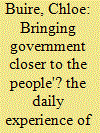

|
|
|
|
|
| Publication |
2011.
|
| Summary/Abstract |
This article considers the ways in which sub-councils 'bring government closer to the people' by creating an intermediary level between local wards and the metropolitan council in Cape Town. Daily encounters between administrative staff, elected representatives and local communities within an impoverished formerly 'black' area demonstrate the intricacy of interactions and relationships between governing strategies from above and the tactics of the governed from below. Beyond conflicting objectives and rationalities, I argue that citizenship may be defined as a constant negotiation of legitimacy between stakeholders, never definitely trapped 'below' or 'above' the actual challenges of the city.
|
|
|
|
|
|
|
|
|
|
|
|
|
|
|
|
| 3 |
ID:
109131
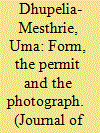

|
|
|
|
|
| Publication |
2011.
|
| Summary/Abstract |
Inspired by recent scholarship that calls for a more critical engagement with archives and knowledge production, this article plots the biography of an archive in Cape Town. Unravelling the layers of paperwork, it locates the origins of the archive in a repressive state project of excluding Indian immigrants and controlling those within the borders of the Cape Colony. The paper trail reveals documents of identity and the state's attempts to verify identity. In seeking to answer the question as to how the historian should approach such an archive of control and surveillance, it concludes that a social history and gendered approach to migration is possible and the real treasures are those documents that enter the archive beyond the limits of state intentions.
|
|
|
|
|
|
|
|
|
|
|
|
|
|
|
|
| 4 |
ID:
141070
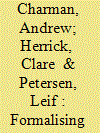

|
|
|
|
|
| Summary/Abstract |
In early 2012, South Africa's Western Cape Province enacted new alcohol control legislation amid mounting concern with the costs of alcohol-related harms. This has focused on urban shebeen closure to control the informal, unlicensed trade and the harms it generates through crime, violence and injury. In contrast to policy discourse, this paper contends that rather than existing outside regulation, the city's shebeeners embrace multiple (self and collective) regulatory strategies to manage the inherent risks of their own informality. Drawing on novel empirical data including a ‘business census’ and interviews with the police and liquor traders across four Cape Town case study sites, the paper adds new depth to contemporary engagements with the appropriate and equitable regulation of the South African informal liquor trade.
|
|
|
|
|
|
|
|
|
|
|
|
|
|
|
|
| 5 |
ID:
113166
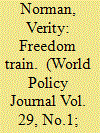

|
|
|
| 6 |
ID:
192929
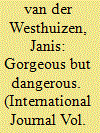

|
|
|
|
|
| Summary/Abstract |
How do deeply unequal cities in the Global South project soft power, and what are the tensions and contradictions that emerge when they do? Cities’ strategies to enhance their international appeal can be gauged through three interlocking or complementary approaches: first, leveraging the strategic value of events and associated services; second, developing iconic architecture and mega-projects; and third, making themselves attractive to the so-called “creative class.” Drawing on a brief comparative analysis of Rio de Janeiro and Cape Town, these strategies are assessed in relation to the dynamics of soft power and soft disempowerment. Although Rio de Janeiro and Cape Town share formidable resources to generate soft power, their societal complexities of crime and violence cast a heavy disempowering shadow on their innovative soft power strategies.
|
|
|
|
|
|
|
|
|
|
|
|
|
|
|
|
| 7 |
ID:
179110
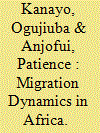

|
|
|
|
|
| Summary/Abstract |
International migration has continued to increase over the years. As people relocate to seek opportunities, their hopes and aspirations for a better life become a driving force. The extent to which their expectations are achieved is not documented in South Africa. This paper examines the expectations versus experiences of international immigrants in South Africa using Cameroonian and Democratic Republic of Congo immigrants residing in Cape Town. A qualitative approach with snowball sampling selected key informants from Cameroonian and Congolese nationalities in Cape Town. Results suggest that most immigrants did not meet their expectations for migrating, due to migration policy limitations of the host country exempting them from opportunities. The results align with both the Capability Approach theory and Lee’s model of migration. Most of the immigrants showed despondency but do not prefer the option of returning to their home country. This is because they have not attained their goals for migration. The paper recommends that policy discussion between the South African government and stakeholders has become imperative to obtain an informed perspective on the dynamics of migration.
|
|
|
|
|
|
|
|
|
|
|
|
|
|
|
|
| 8 |
ID:
113762
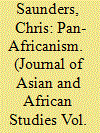

|
|
|
|
|
| Publication |
2012.
|
| Summary/Abstract |
The author of this contribution examines the role that Cape Town played in the advent of Pan-Africanism in South Africa from abroad through the activist efforts of individuals from the West Indies, United States of America (USA) and West Africa in the early twentieth century. He traces how Pan-Africanism in Cape Town went through a number of different phases, the most important politically being that of the Pan-Africanist Congress (PAC) in 1959-60.
|
|
|
|
|
|
|
|
|
|
|
|
|
|
|
|
| 9 |
ID:
157188
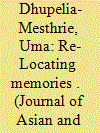

|
|
|
|
|
| Summary/Abstract |
This article plays on the word re-location to examine the memories of Indians in South Africa through oral histories about relocation as a result of the Group Areas Act, to memories of parents and grandparents relocating to South Africa from India as told to interviewers and to their own memories of journeys to India and back. The narratives of mobilities traverse time and national boundaries and are counter-posed by narratives of local mobilities as well as stasis. The article identifies ways of narrating, themes of narration and the meaning of memories while noting the re-location of memory construction against the backdrop of South Africa’s democratic transition and the 150th commemoration of the arrival of indentured Indians to South Africa. It argues that the local and the national are important in narrations of transnational journeys, thus advancing a particular approach to transnational memory studies.
|
|
|
|
|
|
|
|
|
|
|
|
|
|
|
|
| 10 |
ID:
077392
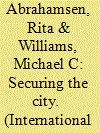

|
|
|
|
|
| Publication |
2007.
|
| Summary/Abstract |
The past decade has witnessed a remarkable expansion and globalisation of the private security sector. These developments mark the emergence of public-private, global-local security networks that play increasingly important roles in global governance. Rather than representing a simple retreat of the state, security privatisation is a part of broad processes in which the role of the state - and the nature and locus of authority - is being transformed and rearticulated. Often presented as apolitical, as the mere effect of market forces and moves towards greater efficiency in service delivery, the authority conferred on private actors can alter the political landscape and in the case of private security has clear implications for who is secured and how. The operation and impact of public/private, global/local security networks is explored in the context of security provision in Cape Town, South Africa.
|
|
|
|
|
|
|
|
|
|
|
|
|
|
|
|
| 11 |
ID:
101921


|
|
|
| 12 |
ID:
129097
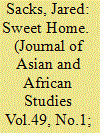

|
|
|
|
|
| Publication |
2014.
|
| Summary/Abstract |
For much of the winter of 2012, communities in shack settlements across Cape Town took to the streets in some of the most active civil disobedience protests since 1994. Knowing that the mainstream political terrain often seeks to obfuscate and mislead the public about the true nature of these protests, this paper investigates claims by politicians from the Democratic Alliance (DA) that these protests were being coordinated by the Youth League of the African National Congress (ANCYL). These big political players moralize the debate, shifting the focus from the perfectly legitimate issues of service delivery and demands for meaningful engagement. Speaking directly to community members of Sweet Home Farm, an informal settlement of 15,000 people in the Philippi area, revealed a yawning chasm between what official players are saying about Sweet Home and the actual realities on the ground.
|
|
|
|
|
|
|
|
|
|
|
|
|
|
|
|
| 13 |
ID:
124260
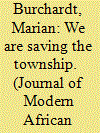

|
|
|
|
|
| Publication |
2013.
|
| Summary/Abstract |
In this article, I trace the emergence of Pentecostal FBOs in the South African city of Cape Town. By focusing on their involvements in HIV/AIDS programmes, including practices such as health education, counselling and material support, I analyse the organisational dynamics and consequences ensuing from their activities. Pentecostal involvements in development work engender complex connections between two distinct processes: On the one hand, they offer Pentecostal communities new social spaces for promoting their faith and moral agendas. On the other hand, development work urges Pentecostal communities to recast their activities in the logic of formal organisation and accountability (proposals-grants-projects). On the ground, these logics are constantly subverted as beneficiaries construe FBOs as patrons and deploy Pentecostal identities for mediating access to FBOs and the resources they command. My argument is that Pentecostal faith works to mediate the entire set of social relationships, expectations, imageries and practices that structure FBO work on the ground. More than belief and ritual, it is Pentecostal belonging that links organisations, people, opportunities and resources.
|
|
|
|
|
|
|
|
|
|
|
|
|
|
|
|
|
|
|
|
|